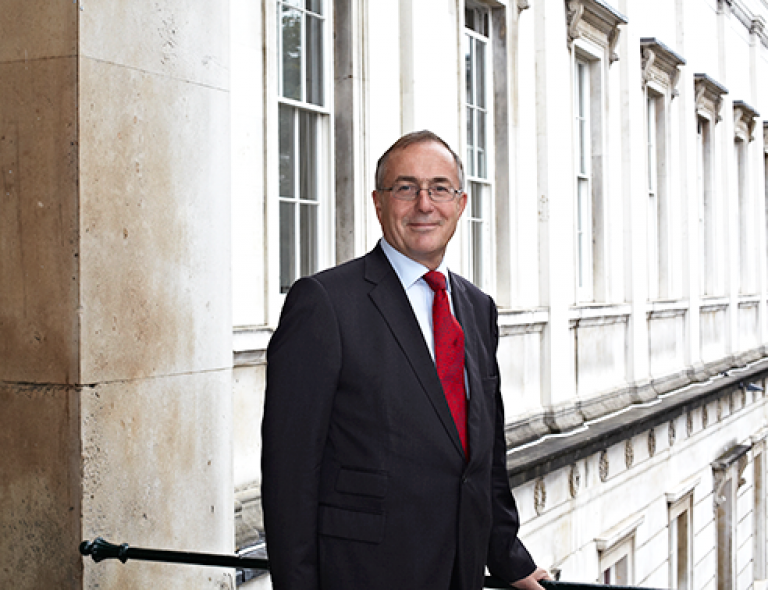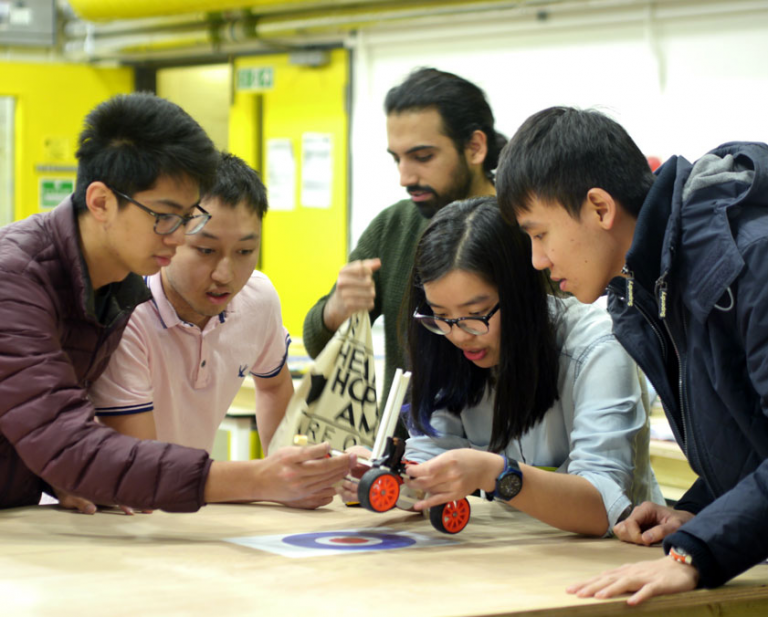Provost's View: Coping with difficulty and uncertainty, but celebrating our progress this academic year
29 June 2017
Recent tragic events, such as the fire at Grenfell Tower and the subsequent evacuation of other tower blocks in Camden over last weekend, serve to remind us that UCL is an integral part of Camden and London and that we can and do play a major role in our locality and our capital city, as well as being a leading global university.

I was incredibly proud of the immediate response of our students to the Grenfell Tower fire, as they organised and delivered emergency help and aid for victims and survivors within hours of the tragedy.
Our students worked hard to collect donations at UCL, and then deliver and organise distribution of that aid to those affected, as well as helping find accommodation for some of those displaced.
More than 30 students took part in this immediate effort, with key leadership roles played by Rob Ahmed, Umar Sabat and Ayo Olantunii. A huge thank you to all these students for a wonderful and selfless response to this terrible tragedy.
The social housing problem escalated over last weekend as Camden Council made the difficult decision to evacuate residents from four of its tower blocks, all of which were thought to have cladding similar to that used at Grenfell Tower.
As I write this, I am aware that several of our staff and students are affected by that, as well as some pupils and their parents from the UCL Academy.
Our Director of Student Accommodation, Duncan Palmer (UCL Estates) spent much of the weekend determining how much of our student accommodation was likely to be unoccupied over the summer.
I am pleased to inform you that we were able to offer accommodation to our affected staff and do the same for our students - though, at present, none of them have needed to take up the offer. In addition, we have offered rooms in Frances Gardner Hall to Camden Council and await their response.
Robin Street, Co-Principal of UCL Academy, was also very active in determining how many pupils and their families needed help, as well as opening the school over the weekend to help with the immediate aftermath of so many displaced families.
This turmoil comes as the academic year draws to a close, and 2016/17 has certainly been marked by a great deal of uncertainty for UCL and the UK in general. In addition to the political fallout from Brexit, we have also been grappling with the consequences of new legislation for higher education, which passed into law just before the recent general election.
What strikes me, however, when I look back over the past year is how UCL marches on effectively, and with considerable success, despite these uncertainties - we've achieved so much in the past 12 months. Here are some of the highlights for me.
Silver award in TEF
Most of you will have read coverage of the TEF last week and will know that UCL has been awarded silver. I want to congratulate the many UCL staff who have played a part in achieving this result, particularly Clare Goudy and Anthony Smith.
It shows that our Education Strategy - putting education firmly on a par with research and building strong links between them - is already bearing fruit.
We were commended in particular for our highly successful approach to supporting students into employment or further study; the innovations that we have introduced to ensure stretch in the curriculum; and for our wide array of exceptional learning resources, both physical and digital.

It goes without saying that we will not be satisfied until our whole community has achieved learning and teaching excellence and we have achieved gold status in a future TEF process. UCL 2034 and our Education Strategy provide us with a clear route towards that goal.
Research highlights of the year
UCL is one of the world's finest research-intensive universities and the sheer volume of outstanding research to be conducted here each year makes it a challenge to select highlights. Nonetheless, there have been some wonderful achievements in the past year that I'd like to mention.
In September, right at the start of the academic year, we announced the establishment of the Centre for the Study of the Legacies of British Slave Ownership at UCL.
This builds on the earlier work of Legacies of British Slave-ownership (LBS) projects, led by UCL's Professor Catherine Hall. The projects have transformed understanding of the significance of slave ownership in Britain, and the new centre will develop and grow this vital work.
We finished First Term on a high, when we were selected as the national hub for a new £250 million UK Dementia Research Institute in December 2016 - a wonderful achievement for UCL that recognises our excellence in neuroscience research.
In February 2017, we were able to announce our involvement in the Rosalind Franklin Institute - a £100 million investment by the government into the development of an innovative multidisciplinary science and technology research centre.
Exceptional individual achievements
Moving to individual achievements of this year, it is timely to congratulate all members of the UCL community named in the Queen's Birthday Honours list, including a knighthood for Professor Alimuddin Zumla (UCL Infection and Immunity) for services to Public Health and Protection from Infectious Diseases.
Professor Mohan Edirisinghe has also enjoyed an exceptional year, winning the Chapman Medal from the Institute of Materials, Minerals and Mining (IOM3), in addition to the Royal Society of Engineers Armourers and Braziers Prize and his 42nd EPSRC award.
Two other individuals that I would like to mention are Professor Claudio Stern (UCL Cell & Developmental Biology), who has been awarded the Harrison Prize in recognition of his outstanding contribution to developmental biology, and Dr Lidia Galdino, who has been listed by the Telegraph as one of their Top 50 Women in Engineering under 35.
Finally, I would like to recognise UCL's five Leverhulme prizewinners (the highest number awarded to a UK university), who were granted the award for "the achievement of outstanding researchers whose work has already attracted international recognition and whose future career is exceptionally promising".
My congratulations to Dr Vanesa Castán Broto (UCL Bartlett Developmental Planning Unit), Dr Lily Okalani Kahn (UCL Hebrew and Jewish Studies), Professor Uta Schönberg (UCL Economics), Dr Alexandra Silva (UCL Computer Science) and Dr David Thornalley (UCL Geography).
UCL East
On Monday this week, we hosted a UCL East Showcase, a fun and informative event that gave a glimpse into the types of activities, programmes and research that will be happening on the new campus, as well as those already going on in the park.
It was attended not only by a cross-section of the UCL community, but also by many external guests, including the Mayor of London's Chief of Staff, David Bellamy, who gave a few words and pledged the support of the Greater London Authority.
In my recent Provost's View, I mentioned how far we have come, and my takeaway from this event is just how accurate this is. We now have a clear and ambitious academic vision for the campus. Representatives from our Arts & Humanities, Built Environment, Engineering Sciences, Life Sciences and Social & Historical Sciences faculties have worked together to finalise the first set of academic activities, united under this vision.
Clear progress has also been made with design and planning. We met a significant milestone last month: the submission of our outline planning application based on our masterplan.
The first building, currently known as Pool Street West, is due to open in September 2020 and will be home to The Future Living Institute. Looking at the past, present and future of living, both locally and internationally, it will explore global challenges such as planetary sustainability, understanding nature, environment and urbanisation, global communications and social inclusivity.
Transforming UCL
Finally, I'd like to reflect on this year's progress to transform our estate for the benefit of all staff and students. Delivered by UCL Estates, our Transforming UCL programme continues to gather pace.
I know that some of you feel that we pay far too much attention to these major developments, but four years in to my time as President and Provost, I am still asked on an almost daily basis to find yet more space, driven primarily by our phenomenal success in winning research grants and awards, as well as expansion of student numbers.
More than £300 million of major projects are currently under construction across 17 sites - a programme that will culminate with the completion of the New Student Centre in December 2018.
This year has most notably seen the completion of 22 Gordon Street, the new home for UCL Bartlett School of Architecture, delivering nearly double the amount of teaching and research space on the former site of Wates House.
Then, just last week, we had the launch of Confucius Institute, an elegant and sustainable renovation of a Georgian terrace to provide high-quality working spaces for the UCL Institute of Education Confucius Institute for Schools.
Finally, I'd like to mention the Wilkins Terrace and Lower Refectory, which are open for business from 10 July. A stunning new development at the heart of the Bloomsbury campus, this transformation project will deliver an inclusive outdoor exhibition, event and social space, a 324-seat refectory delivering quality new catering and a pedestrian walkway linking Gordon Street and Gower Street.
The Wilkins Terrace will make enormous difference to UCL and this large-scale project, designed to deliver benefit to staff and students alike, will enable enhanced interactions among our community and an easier flow across the heart of our Bloomsbury campus. What better way to mark the start of summer at UCL?
Enjoy your summer
With the teaching year and examinations now over, academic staff are immersed in research or planning activity and a greater number of you will be spending time away from our Bloomsbury campus. Whether you are researching, travelling, or hatching plans for time with family and friends, I wish everyone in the UCL community a good summer.
Professor Michael Arthur
President & Provost
 Close
Close

